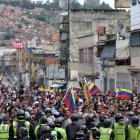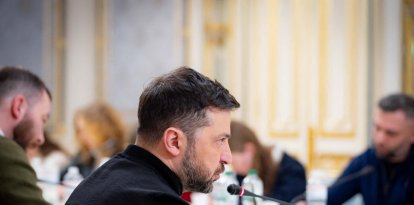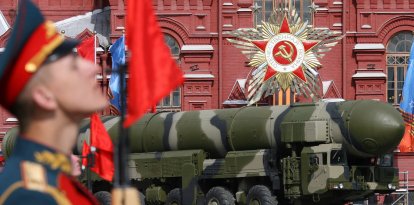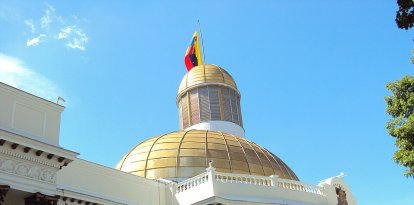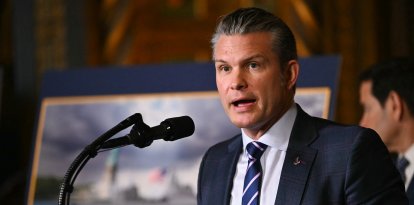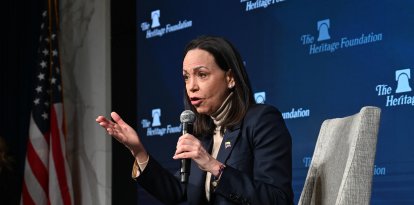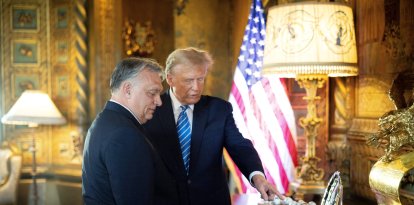Mass protests in Venezuela leave several dead, dozens wounded and shows that most Venezuelans want Maduro ousted
Protesters and witnesses told VOZ that opposition motorized groups protected citizens from armed Chavista groups.

A demonstrator kicks a tear gas canister during a protest against Maduro's dictatorship.
After Nicolas Maduro's regime perpetrated a notorious electoral fraud this Sunday, July 28th, Venezuelans massively took to the streets in all regions of the country to defend the votes of candidate Edmundo González and recover their democracy.
From pole to pole, from Zulia to Bolivar, and centralizing the activity in the center of the South American country -Caracas, Valencia, Miranda, Aragua and La Guaira- Venezuelans chanted, demanding the exit of Maduro and the Chavista regime. The most popular areas of Caracas, such as Petare, Catia and 23 de Enero, all historically Chavista, drove the national mega mobilization of the opposition in the morning, around 9:00, when a spontaneous "cacerolazo" activated a country that had been living in a tense calm since the early morning.
Surprisingly, in Petare, people shouted historically leftist slogans such as "The people, the only one, will never be defeated" to demonstrate against the dictatorship. The opposition also promoted other anti-Chavista chants: "I don't want bonuses, I don't want CLAP, what I want is for Nicolás to go away."
In emotional images, which quickly went viral on social media, the demonstrators knocked down at least five statues of Hugo Chávez, Maduro's socialist predecessor. They burned giant campaign billboards of the current dictator, took over key points of the country such as the Maiquetía Airport, and approached the vicinity of the main Venezuelan barracks to promote a military break that could be definitive for the fall of the regime.
The response of Chavismo, however, was fierce, so much so that some analysts described it as "savage." The National Police, controlled by the regime, shot to kill several demonstrators throughout the country. Two young men from Zulia and Aragua were killed, according to international media reports. Another protester was also confirmed killed in Yaracuy, and independent journalist Daniel Blanco published four videos on his social media where one can see several protesters killed. Reports of wounded also came in throughout the afternoon and evening as pockets of protests still remain throughout Venezuela. All figures are unofficial and come through independent reports from citizens and journalists on the ground in the face of the authorities' silence.
🚨 #Venezuela | Según varios informes, un joven de 15 años es asesinado en San Francisco, Zulia, durante las manifestaciones pic.twitter.com/y5uU7dpVZp
— VOZ (@VozMediaUSA) July 30, 2024
🚨 | Derriban estatuas de Chávez en Portuguesa, La Guaira y Guárico pic.twitter.com/DvbUbFQ8en
— VOZ (@VozMediaUSA) July 30, 2024
🚨 #ULTIMAHORA | El pueblo venezolano está tomando en estos momentos el Aeropuerto Internacional de Maiquetía, en Caracas pic.twitter.com/LeBbeMfr0N
— VOZ (@VozMediaUSA) July 29, 2024
Blanco also reported that Aragua, the Venezuelan state where the famous criminal gang "El Tren de Aragua" was born, was the area with the highest confirmed concentration of protesters with gunshot wounds.
"Among the victims of the day was journalist Jesús Romero with impacts in the abdomen and leg," Blanco stated.
Likewise, the organization Foro Penal reported on its social media that 46 people were arrested for "post-election events": 17 in Barinas, ten in Anzoátegui, six in Capital District, six in Aragua, three in Zulia, two in Carabobo, one in Miranda and another in Mérida.
But, despite the repression, the demonstrators showed courage and stayed in the streets, defending the Venezuelan opposition's call: "We won and we are going to collect."
María Corina Machado, leader of the Venezuelan opposition, acknowledged in a press conference the demonstrators' courage while stating that she was proud of the country's response to Maduro's fraud. In the same press conference, Machado gave great news: the opposition, which has 73 % of the electoral records in its possession, already has the evidence to prove its resounding triumph. A preliminary report confirmed that candidate Edmundo Gonzalez surpassed dictator Maduro, reaching 6,275,182 votes against 2,259,256. The electoral reports are now being uploaded to a web page where the validity of all the reports can be confirmed. Machado said that the minutes are already in the possession of different world governors who can now verify the actual results, other than the numbers without proof announced by Maduro's National Electoral Council.
Testimonies of a historic day
A demonstrator in Zulia, who requested anonymity for fear of reprisals, said that in his protest focus one detail made the difference: the opposition motorcyclists who protected them from the so-called "colectivos Chavistas," armed paramilitary groups that repress anti-Chavista protests while touring the cities with their motorcycles.
"The people in the streets are hopeful, they believe there is a strategy and that the Armed Forces will accompany them in the coming hours," said this source, originally from Maracaibo, the capital of Zulia state. "In the points where the protests are accompanied by burning of tires the colectivos were walking in caravans to intimidate, but the people armed themselves with stones and ran them off."
"They also had problems because this time the opposition has motorized force. Some 300 motorcycles together protected the protest points in Maracaibo," he said. "These motorcycles moved to the points where colectivos were arriving to run them off as well."
One person in Valencia, who did not join the demonstrations but had a privileged view of the main upcoming ones in the city, also saw how constantly opposition motorized groups were defending the protest spots from the Chavista collectives.
This person, who sent several videos to VOZ, stated: "The number of motorcycles was impressive. In previous years I would have told you that they were collectives of the regime, today I know that they are motorcycles that go to protect the protesters."
In La Silsa, west of Caracas, a witness reported that, after the "cacelorazos," many demonstrators took to the streets in a matter of hours. Then, when the Chavista colectivos arrived, people planted themselves until the rain, along with the threats, dissipated the protests.
"I was right in front of SILSA, in the whole neighborhood, and in the morning there was a spontaneous cacerolazo, like in the whole city. People started to cacerole after the word got out about the cacerolazo in Petare. It was a strong cacerolazo, perhaps not unprecedented, because it had been heard in previous years of protests, but it was quite intense," said the source.
"As the morning hours passed, or maybe at noon, I was surprised to see many people coming down who were protesting in Propatria, since it is quite close. There were a lot of people with Venezuelan flags and quite a few motorized vehicles, but not colectivos, but people demonstrating against the fraud. A lot of young people were tearing up Maduro's campaign signs and posters, pulling them off poles and trampling them, something that has been seen in other parts of the city. The surprising thing here is that it was quite massive, despite being an area completely surrounded by colectivos," he continued.
"When the colectivo motorcycles arrived, maybe 15 or so, the people backed off a bit, but the majority remained firm. There were some slight confrontations, the colectivos hit some of them, and the women, who are very arrechas, confronted them face to face."
"Arrechas" is a very broad Venezuelan term that, in this case, defines bravery. However, it could also define generalized anger.
That is why another person from Catia told VOZ that "people are angry with the fraud" and it is a matter of time before the situation "gets ugly." This person said that the anger in his area was generalized and that the demonstrations are likely to continue as the days go by.
Machado told Venezuelans that tomorrow, peacefully, they should take to the streets in small assemblies where they will meet from 11 to 12 noon to express their dissatisfaction with the results.





